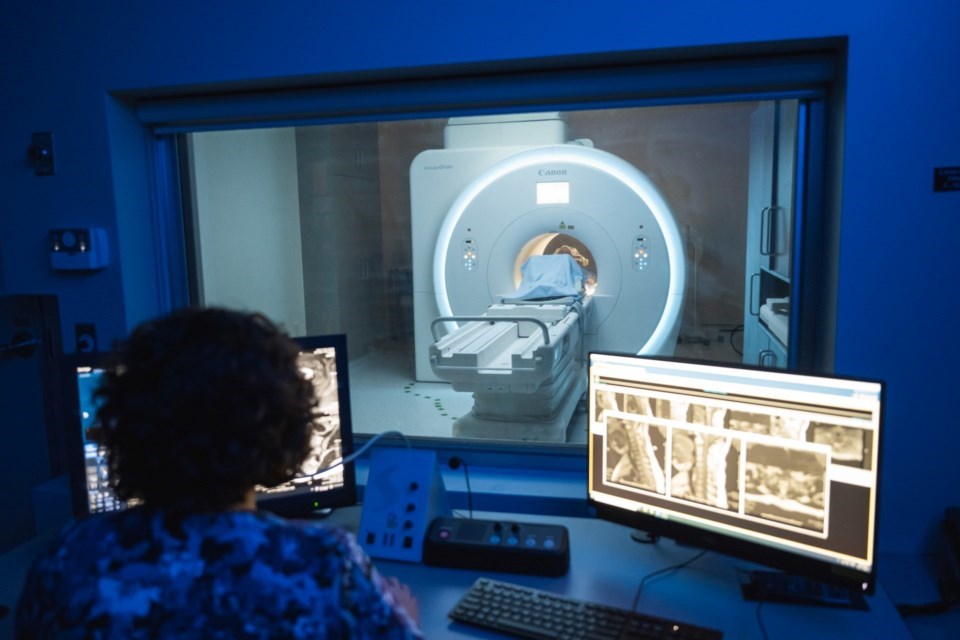MRI wait times continue to cause concern for Midland-area hospital officials as they keep pushing the province to get a machine of their own.
“We’re the largest acute care hospital without an operating or approved MRI,” said Georgian Bay General Hospital communications director Jennifer Moore.
Moore says wait times haven’t improved since the hospital formally applied earlier this year to secure one of 14 spots across Ontario that will receive funding to start offering MRI (magnetic resonance imaging) services.
“When we submitted our proposal in January, we knew that only 37 per cent of patients receiving an MRI in Orillia or Barrie were within the provincial target wait time,” Moore said.
“As of June, only 29 per cent are receiving their MRI within the target time set by the province. For a patient to have a 50 per cent shot of receiving an MRI within the target time, they have to travel more than 100 kilometres from here, into the GTA. Travel expenses and logistics can be a barrier to access for patients.”
Midland family physician Dr. Jeff Golisky says he’s seen an increase in the number of patients needing an MRI in recent years, especially given the region’s aging demographic.
While Golisky noted that hospitals in Orillia and Barrie have been “quite accommodating at facilitating our patients,” offering MRIs locally would be a real boost to local health care.
“The urgent ones get done (in Barrie and Orillia), but the less urgent scans can take some time,” Golisky said.
Those who are left waiting are often those requiring an MRI for clinical procedures like breast cancer screening, a tool used in addition to a mammography for high-risk women.
“It can take up to six months. I think having it here would improve things in many ways," Golisksy said.
Besides eliminating the need for patients to travel out of town, Golisky said having an MRI machine locally would save money and stress in the long run since those already admitted to hospital wouldn’t have to leave GBGH.
“It might decrease the need for admissions,” he said, noting some people are admitted to hospital with a physician then ordering an MRI, which means staff must accompany patients in a patient-transfer vehicle when they have to travel for an MRI procedure.
An MRI is a non-invasive medical imaging exam that helps radiologists to diagnose a variety of diseases, including cancer. An MRI machine uses a powerful magnetic field, radio frequency pulses and a computer to produce detailed pictures of organs, soft tissues, bone and other structures inside the body.
As for his own practice, Golisky estimated he orders 20 to 30 MRI scans annually.
While GBGH offers computerized tomography (CT) scans, Golisky MRIs are better when looking at the spine and brain or when trying to detect potential tumours or aneurysms.
He added: “It’s also a good tool for looking at joint and cartilage issues.”
The hospital’s application seeks approval for 3,900 operational hours, which would equate to roughly $1 million in annual funding. Capital costs to buy the actual machine and renovate a room near the hospital’s diagnostic imaging department would cost in the $4-million range.
Individual hospitals and communities are expected to raise the capital funds for the purchase and any renovations.
For its part, the province’s Ministry of Health would provide funding for the hours of operation.
Former GBGH CEO Gail Hunt earlier told MidlandToday that by using postal code data, the hospital was able to identify close to 4,000 local residents, who make the trip to Royal Victoria Regional Health Centre in Barrie, Orillia Soldiers’ Memorial Hospital and sometimes even farther afield to have an MRI procedure on an annual basis.
“And that doesn't capture anybody who's a seasonal resident because their postal code would be the GTA area,” Hunt said, adding that having a machine locally would also reduce waiting times.
Unlike a CT scan or general X-ray, no ionizing radiation is involved with an MRI, according to the Ontario Association of Radiologists.
"In many cases, MRI gives different information about structure in the body than can be seen with an X-ray, ultrasound or CT scan," the association noted. "MRI also may show problems that cannot be seen with other imaging methods. This information is then sent to a computer, which processes all the signals and generates it into an image.
"The final product is a 3-D image representation of the area being examined. These images can then be displayed and examined on a computer monitor, transmitted electronically, printed, or copied to a CD."



